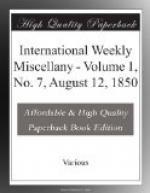* * * * *
FROM GRAHAM’S MAGAZINE FOR AUGUST
MANUELA.
A BALLAD OF CALIFORNIA.
BY BAYARD TAYLOR.
From the doorway, Manuela, in the sheeny
April morn,
Southward looks, along the valley, over
leagues of gleaming corn;
Where the mountain’s misty rampart
like the wall of Eden towers,
And the isles of oak are sleeping on a
painted sea of flowers.
All the air is full of music, for the
winter rains are o’er,
And the noisy magpies chatter from the
budding sycamore;
Blithely frisk unnumbered squirrels, over
all the grassy slope;
Where the airy summits brighten, nimbly
leaps the antelope.
Gentle eyes of Manuela! tell me wherefore
do ye rest
On the oaks’ enchanted islands and
the flowery ocean’s breast?
Tell me wherefore down the valley, ye
have traced the highway’s mark
Far beyond the belts of timber, to the
mountain-shadows dark?
Ah, the fragrant bay may blossom, and
the sprouting verdure shine
With the tears of amber dropping from
the tassels of the pine.
And the morning’s breath of balsam
lightly brush her sunny cheek—
Little recketh Manuela of the tales of
Spring they speak.
When the Summer’s burning solstice
on the mountain-harvests glowed,
She had watched a gallant horseman riding
down the valley road;
Many times she saw him turning, looking
back with parting thrills,
Till amid her tears she lost him, in the
shadow of the hills.
Ere the cloudless moons were over, he
had passed the Desert’s sand.
Crossed the rushing Colorada and the dark
Apache Land,
And his laden mules were driven, when
the time of rains began.
With the traders of Chihuaha, to the Fair
of San Juan.
Therefore watches Manuela—therefore
lightly doth she start,
When the sound of distant footsteps seems
the beating of her heart;
Not a wind the green oak rustles or the
redwood branches stirs,
But she hears the silver jingle of his
ringing bit and spurs.
Often, out the hazy distance, come the
horsemen, day by day,
But they come not as Bernardo—she
can see it, far away;
Well she knows the airy gallop of his
mettled alazan,[5]
Light as any antelope upon the Hills of
Gavilan.
She would know him mid a thousand, by
his free and gallant air;
By the featly-knit sarape,[6] such as
wealthy traders wear;
By his broidered calzoneros[7] and his
saddle, gaily spread,
With its cantle rimmed with silver, and
its horn a lion’s head.
None like he the light riata[8] on the
maddened bull can throw;
None amid the mountain-canons, track like
he the stealthy doe;
And at all the Mission festals, few indeed
the revelers are
Who can dance with him the jota, touch
with him the gay guitar.
He has said to Manuela, and the echoes




